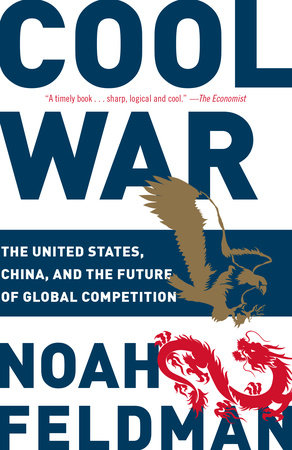Cool War
The United States, China, and the Future of Global Competition
Noah Feldman
Paperback
September 1, 2015 | ISBN 9780812982558
AmazonBarnes & NobleBooks A MillionBookshop.orgHudson BooksellersPowell'sTargetWalmart
Audiobook Download
May 21, 2013 | ISBN 9780385362153
Ebook
May 21, 2013 | ISBN 9780679643838
AmazonApple BooksBarnes & NobleBooks A MillionGoogle Play StoreKobo
About the Book
A bold and thought-provoking look at the future of U.S.-China relations, and how their coming power struggle will reshape the competitive playing field for nations around the world
The Cold War seemingly ended in a decisive victory for the West. But now, Noah Feldman argues, we are entering an era of renewed global struggle: the era of Cool War. Just as the Cold War matched the planet’s reigning superpowers in a contest for geopolitical supremacy, so this new age will pit the United States against a rising China in a contest for dominance, alliances, and resources. Already visible in Asia, the conflict will extend to the Middle East (U.S.-backed Israel versus Chinese-backed Iran), Africa, and beyond.
Yet this Cool War differs fundamentally from the zero-sum showdowns of the past: The world’s major power and its leading challenger are economically interdependent to an unprecedented degree. Exports to the U.S. account for nearly a quarter of Chinese trade, while the Chinese government holds 8 percent of America’s outstanding debt. This positive-sum interdependence has profound implications for nations, corporations, and international institutions. It makes what looked to be a classic contest between two great powers into something much more complex, contradictory, and badly in need of the shrewd and carefully reasoned analysis that Feldman provides.
To understand the looming competition with China, we must understand the incentives that drive Chinese policy. Feldman offers an arresting take on that country’s secretive hierarchy, proposing that the hereditary “princelings” who reap the benefits of the complicated Chinese political system are actually in partnership with the meritocrats who keep the system full of fresh talent and the reformers who are trying to root out corruption and foster government accountability. He provides a clear-eyed analysis of the years ahead, showing how China’s rise presents opportunities as well as risks. Robust competition could make the U.S. leaner, smarter, and more pragmatic, and could drive China to greater respect for human rights. Alternatively, disputes over trade, territory, or human rights could jeopardize the global economic equilibrium—or provoke a catastrophic “hot war” that neither country wants.
The U.S. and China may be divided by political culture and belief, but they are also bound together by mutual self-interest. Cool War makes the case for competitive cooperation as the only way forward that can preserve the peace and make winners out of both sides.
Praise for Cool War
“A timely book . . . sharp, logical and cool.”—The Economist
“Noah Feldman’s dissection of the United States–China relationship is smart, balanced, and wise.”—Robert D. Kaplan, New York Times bestselling author of The Revenge of Geography
“Compelling . . . Feldman’s book carries enough insight to warrant serious attention from anyone interested in what may well be the defining relationship in global affairs for decades to come.”—Kirkus Reviews
“A worthwhile and intriguing read.”—The Washington Post
“Masterfully elucidates China’s non-democratic/non-communist new form of government.”—Publishers Weekly
The Cold War seemingly ended in a decisive victory for the West. But now, Noah Feldman argues, we are entering an era of renewed global struggle: the era of Cool War. Just as the Cold War matched the planet’s reigning superpowers in a contest for geopolitical supremacy, so this new age will pit the United States against a rising China in a contest for dominance, alliances, and resources. Already visible in Asia, the conflict will extend to the Middle East (U.S.-backed Israel versus Chinese-backed Iran), Africa, and beyond.
Yet this Cool War differs fundamentally from the zero-sum showdowns of the past: The world’s major power and its leading challenger are economically interdependent to an unprecedented degree. Exports to the U.S. account for nearly a quarter of Chinese trade, while the Chinese government holds 8 percent of America’s outstanding debt. This positive-sum interdependence has profound implications for nations, corporations, and international institutions. It makes what looked to be a classic contest between two great powers into something much more complex, contradictory, and badly in need of the shrewd and carefully reasoned analysis that Feldman provides.
To understand the looming competition with China, we must understand the incentives that drive Chinese policy. Feldman offers an arresting take on that country’s secretive hierarchy, proposing that the hereditary “princelings” who reap the benefits of the complicated Chinese political system are actually in partnership with the meritocrats who keep the system full of fresh talent and the reformers who are trying to root out corruption and foster government accountability. He provides a clear-eyed analysis of the years ahead, showing how China’s rise presents opportunities as well as risks. Robust competition could make the U.S. leaner, smarter, and more pragmatic, and could drive China to greater respect for human rights. Alternatively, disputes over trade, territory, or human rights could jeopardize the global economic equilibrium—or provoke a catastrophic “hot war” that neither country wants.
The U.S. and China may be divided by political culture and belief, but they are also bound together by mutual self-interest. Cool War makes the case for competitive cooperation as the only way forward that can preserve the peace and make winners out of both sides.
Praise for Cool War
“A timely book . . . sharp, logical and cool.”—The Economist
“Noah Feldman’s dissection of the United States–China relationship is smart, balanced, and wise.”—Robert D. Kaplan, New York Times bestselling author of The Revenge of Geography
“Compelling . . . Feldman’s book carries enough insight to warrant serious attention from anyone interested in what may well be the defining relationship in global affairs for decades to come.”—Kirkus Reviews
“A worthwhile and intriguing read.”—The Washington Post
“Masterfully elucidates China’s non-democratic/non-communist new form of government.”—Publishers Weekly
Read more
Close




